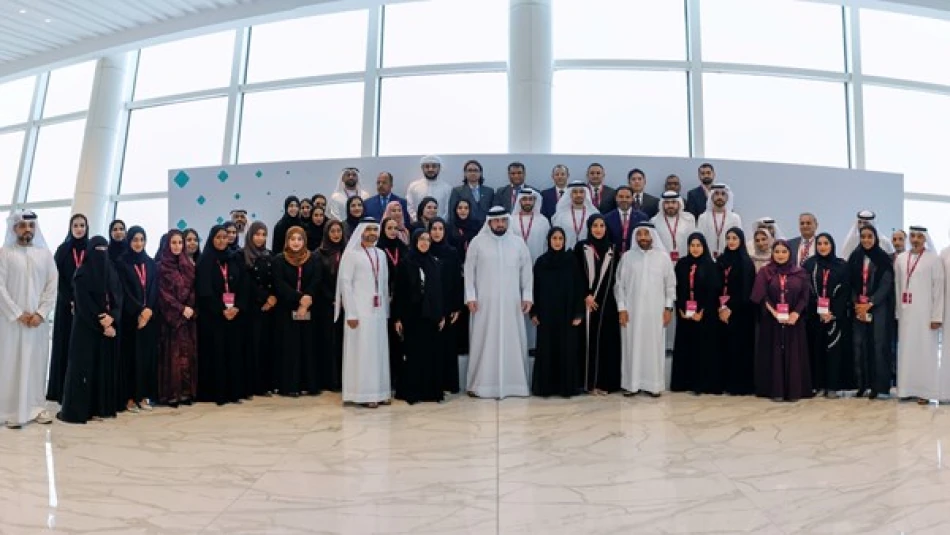
Dubai's Top Secondary Graduates Honored, Studying Abroad Recognized by Ahmed bin Mohammed
Dubai Doubles Down on Global Education Investment with $300 Million Scholarship Drive
Dubai is accelerating its ambitious human capital strategy through expanded scholarship programs that will send 100 top Emirati students annually to world-class universities. With a total budget of 1.1 billion dirhams ($300 million) over the coming years, the initiative represents one of the Gulf's most comprehensive investments in developing homegrown talent for the knowledge economy.
Strategic Vision Behind the Investment
Sheikh Ahmed bin Mohammed bin Rashid Al Maktoum, Second Deputy Ruler of Dubai, emphasized that the scholarship programs embody Crown Prince Sheikh Hamdan's directive to prioritize human investment as the cornerstone of sustainable development. Speaking to outstanding high school graduates on Friday, he positioned education as a "national priority" that receives full support across all developmental sectors.
The timing is strategic. As Dubai prepares for its 2033 economic and social agenda, the emirate recognizes that competing globally requires citizens educated at institutions that rank among the world's top 10 universities. This approach mirrors Singapore's early investment in overseas education during its transformation into a financial hub, and echoes similar programs in South Korea that helped build its technology sector dominance.
Program Scale and Selection Criteria
The Hamdan bin Mohammed Academic Scholarship Program received 413 applications for its second cohort in 2025, targeting studies in health sciences, business administration, engineering, law, and information technology across 45 prestigious national and international universities. The selection process emphasizes three key factors: academic excellence in secondary education, international ranking of the target university and program, and alignment with Dubai's future economic sector needs.
This strategic alignment sets Dubai's approach apart from traditional scholarship programs. Rather than simply sending students abroad, the emirate is deliberately cultivating expertise in sectors identified as crucial for its economic diversification beyond oil dependency.
Market Implications and Economic Returns
The program's 1.1 billion dirham investment signals Dubai's confidence in human capital as a long-term economic driver. For context, this amount could fund approximately 1,000 students through complete undergraduate and graduate programs at top-tier institutions, creating a substantial pipeline of globally-educated Emiratis.
The economic logic is compelling: Each scholarship recipient represents a potential future leader in sectors ranging from fintech to renewable energy, areas where Dubai seeks to establish regional dominance. The program's focus on matching academic specializations with future labor market needs suggests a calculated approach to building competitive advantages in emerging industries.
Regional Competition and Positioning
Dubai's scholarship initiative comes as Gulf states intensify competition for talent and economic diversification. Saudi Arabia's Vision 2030 includes similar educational investments, while Qatar has established Education City to attract international universities. However, Dubai's approach of sending students to established global institutions rather than importing education may prove more effective in building international networks and exposure.
The program also addresses a critical challenge facing Gulf economies: reducing dependence on expatriate expertise while building indigenous capabilities. By targeting 100 students annually, Dubai is creating a steady flow of internationally-educated citizens who can eventually assume leadership roles across key sectors.
Implementation and Support Structure
Aisha Abdullah Miran, Director General of Dubai's Knowledge and Human Development Authority, highlighted that the program places each student "at the heart of the educational process." The comprehensive support structure includes orientation programs, ongoing mentorship, and detailed student guides covering all aspects of the scholarship experience.
The program operates under Dubai's Social Agenda initiatives, with a steering committee overseeing strategic vision, unified scholarship policies, budget approval, and subcommittee formation. This institutional framework suggests long-term commitment beyond individual leadership changes.
Measuring Success and Future Outlook
Early indicators from the program's first cohort show promising results, according to officials, though specific metrics weren't disclosed. The real test will come as graduates return to Dubai and integrate into the local economy. Success will likely be measured not just by employment rates, but by graduates' ability to drive innovation, establish new businesses, and assume leadership positions in strategic sectors.
The program's ultimate success hinges on Dubai's ability to retain these globally-educated citizens and provide career opportunities that match their enhanced qualifications. This challenge has historically faced other Gulf states, where scholarship recipients sometimes remain abroad or struggle to find roles that utilize their international education.
As regional economies pivot toward knowledge-based industries, Dubai's substantial bet on overseas education could provide a decisive advantage in building the human capital necessary for sustained economic transformation.
Most Viewed News

 Layla Al Mansoori
Layla Al Mansoori






